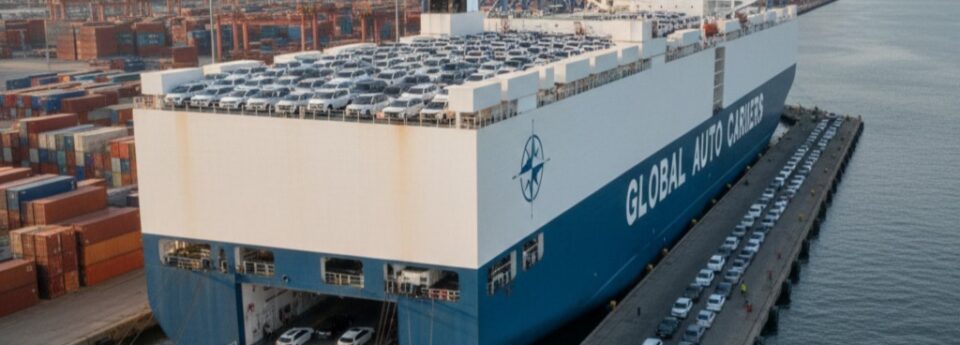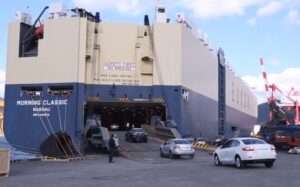
UK Customs Clearance for Vehicles: Your Expert Guide | Ship Cars Ltd
Navigating UK customs clearance for imported vehicles can be a complex process, involving a multitude of regulations, documentation, and potential challenges. At Ship Cars Ltd., we specialise in simplifying this critical stage of international vehicle shipping. Whether you are importing a car from the USA, Japan, or any other country, our comprehensive understanding of UK customs procedures ensures a smooth and efficient clearance process for your vehicle into Southampton, London Gateway, Liverpool, Teesport, or any other UK port. Ship Cars Ltd
Understanding UK Customs Clearance for Vehicles
Customs clearance is the official process of meeting all regulations and completing all documentation required by HMRC (His Majesty’s Revenue and Customs) to allow your vehicle to enter the UK. This involves declaring the vehicle, paying applicable duties and taxes, and ensuring compliance with all import laws.
Key Stages of UK Customs Clearance:
- Pre-Arrival Notification: Lodging necessary declarations before the vehicle arrives in UK waters.
- Customs Declaration: Submitting detailed information about the vehicle, its value, and its origin.
- Duty and Tax Payment: Calculating and paying applicable Import Duty and VAT.
- Inspection (if required): Facilitating any physical inspections by customs officials.
- Vehicle Approval: Ensuring the vehicle meets UK roadworthiness and emissions standards (e.g., IVA test), which is separate from customs but often required before registration.
Required Paperwork for UK Customs Clearance

Accurate and complete documentation is paramount for a successful customs clearance. The specific documents required can vary depending on the vehicle’s origin, value, age, and the import circumstances (e.g., personal import, Transfer of Residence).
Essential Documents:
- Bill of Lading (BOL) / Air Waybill: The transport document issued by the shipping company, proving ownership and detailing the shipment.
- Proof of Ownership:
- Vehicle Title / Certificate of Origin (from countries like USA, Japan, etc.)
- Original Purchase Invoice / Bill of Sale: Detailing the purchase price and terms.
- HM Revenue & Customs (HMRC) Forms:
- Entry Summary Declaration (ENS): A pre-arrival declaration.
- Import Declaration (C88/SAD): The formal customs declaration form detailing the vehicle’s value, classification, origin, etc. This is crucial for calculating duties and taxes.
- VT1 Form: If you are importing the vehicle under the Transfer of Residence (ToR) scheme. This must be approved by HMRC before arrival.
- Technical Information:
- Vehicle Identification Number (VIN)
- Make, Model, Year of Manufacture
- Engine Capacity and type (petrol, diesel, hybrid, electric)
- CO2 Emissions data (for certain tax calculations).
- Proof of Value: Purchase invoice, valuation reports, or previous sale records.
- Passport / Photographic ID: For the importer.
- Proof of UK Address: To confirm residency.
Ship Cars Ltd. will assist you in gathering and preparing the necessary documentation, but it is essential for the importer to provide accurate details and specific proofs of ownership and value.
UK Customs Duty and Tax
When importing a vehicle into the UK, you will typically be liable for Import Duty and Import VAT.
- Import Duty:
- Standard Rate: For most vehicles imported from outside the EU (e.g., USA, Japan), the standard rate of Customs Duty is 10% of the vehicle’s customs value.
- Customs Value: This is calculated as the purchase price of the vehicle, plus the cost of shipping and insurance to bring it to the UK border (CIF value).
- Import VAT:
- Standard Rate: The current rate of Import VAT is 20%.
- Calculation: VAT is charged on the total of the customs value plus the Import Duty.
- Formula: ( {Total Taxable Value} = {Customs Value} + {Import Duty}
- {Import VAT} = 20%{Total Taxable Value}
- Transfer of Residence (ToR) Relief:
- Exemption: If you qualify for ToR relief and have obtained prior approval from HMRC, you can be exempt from paying Import Duty and VAT on your personal vehicle when you move your residence to the UK.
- Conditions: Strict criteria apply, including owning and using the vehicle for at least 6 months prior to moving, and not disposing of it for 12 months after import.
- Other Potential Charges:
- Luxury Car Tax (LCT): For vehicles valued above a certain threshold (£40,000 as of recent regulations), an additional tax applies. This is currently an extra 13.5% on top of Duty and VAT for the portion of the value above the threshold.
- Excise Duty: While less common for standard car imports, certain types of vehicles or fuel types might be subject to specific excise duties.
How Long Does UK Customs Clearance Take?
The timeframe for UK customs clearance can vary significantly based on several factors:
- Completeness of Documentation: Accurate and complete paperwork submitted promptly is crucial for swift processing. Missing or incorrect documents are the most common cause of delays.
- Vehicle Inspection: If HMRC decides to physically inspect the vehicle, this can add time, especially if the vehicle is at a busy port.
- Customs Workload: The general volume of imports being processed by HMRC at any given time.
- Complexity of Import: ToR applications or vehicles with unusual specifications may require more detailed scrutiny.
- Port Operations: Efficiency of the port authorities in handling documentation and releasing cargo.
Typical Timelines:
- Standard Clearance: With all documentation in order, clearance can often be achieved within 2-5 working days after the vehicle’s arrival and the submission of the import declaration.
- Delays: If issues arise with documentation, inspections, or compliance checks, clearance can take 1-2 weeks or longer.
Ship Cars Ltd. works diligently to ensure all necessary pre-arrival information is submitted correctly to minimise delays. We maintain constant communication with customs brokers and port authorities to expedite the process.
What Can Go Wrong? Common Customs Clearance Issues

Despite best efforts, several issues can cause delays or complications during UK customs clearance:
- Incorrect Vehicle Valuation: Undervaluation of the vehicle can lead to penalties and delays as HMRC investigates. Providing accurate purchase invoices and supporting documentation is vital.
- Incomplete or Inaccurate Documentation: Missing forms, incorrect details (VIN, model year), or lack of proof of ownership are common reasons for rejection or holds.
- Failure to Meet UK Standards: If a vehicle does not meet UK emissions or safety standards (and isn’t being modified), it cannot be cleared for normal use on UK roads. This issue is addressed by the DVSA’s IVA test, which is separate from customs but often a prerequisite for final release and registration.
- ToR Application Issues: Submitting the ToR application late, not having it approved before arrival, or failing to meet the eligibility criteria will result in the full payment of duties and taxes.
- Prohibited or Restricted Goods: Attempting to import items that are banned or restricted in the UK, even if within the vehicle.
- Lack of Clear Evidence of Origin: Difficulty in proving the vehicle’s country of origin can impact duty rates.
- Shipping Personal Belongings (on RoRo): As RoRo explicitly forbids personal items, discovering them can lead to penalties, confiscation, or refusal of clearance.
Ship Cars Ltd.’s Role in Your Customs Clearance
Ship Cars Ltd. provides end-to-end support for your vehicle import, including navigating customs clearance:
- Shipping Method Expertise: We offer RoRo, shared container, and dedicated container services, ensuring the right method for your vehicle.
- Documentation Assistance: We guide you on the required paperwork for both export from the origin country and import into the UK.
- Customs Liaison: We work with trusted customs brokers and directly with port authorities to facilitate the clearance process.
- Duty and Tax Guidance: We help you understand the potential tax and duty liabilities based on the vehicle’s origin and value.
- Pre-Clearance Procedures: We aim to submit necessary declarations ahead of the vehicle’s arrival to expedite the process.
Preparing for Import:
- Vehicle Preparation: Ensure your vehicle is properly prepared. Refer to our guides: How to Prepare Your Car for Shipping and Preparing Your Car for Export
- Avoiding Mistakes: Learn from common errors: Top 10 Mistakes People Make During International Car Shipping
- Damage Prevention: Understand how to minimise risks: How to Avoid Damage with International Shipping
Container Shipping Options:
- Explore our secure options: International Container Shipping
Entrust your UK customs clearance to Ship Cars Ltd. Our expertise ensures your imported vehicle moves smoothly through the necessary procedures, allowing you to enjoy your car on UK roads sooner.
Contact us today to discuss your vehicle import and customs clearance needs.







